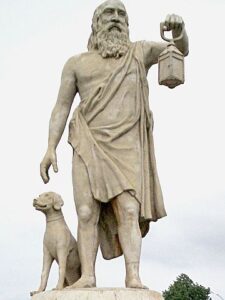ἐπεὶ δὲ ἀπέθανεν ὁ Ἀντισθένης καὶ τῶν ἄλλων οὐδένα ἡγεῖτο συνουσίας ἄξιον, μετέβη εἰς Κόρινθον, κἀκεῖ διῆγεν οὔτε οἰκίαν μισθωσάμενος οὔτε παρὰ ξένῳ τινὶ καταγόμενος, ἀλλ᾽ ἐν τῷ Κρανείῳ θυραυλῶν. [5] ἑώρα γὰρ ὅτι πλεῖστοι ἄνθρωποι ἐκεῖ συνίασι διὰ τοὺς λιμένας καὶ τὰς ἑταίρας, καὶ ὅτι ἡ πόλις ὥσπερ ἐν τριόδῳ τῆς Ἑλλάδος ἔκειτο. δεῖν οὖν τὸν φρόνιμον ἄνδρα, ὥσπερ τὸν ἀγαθὸν ἰατρόν, ὅπου πλεῖστοι κάμνουσιν, ἐκεῖσε ἰέναι βοηθήσοντα, οὕτως ὅπου πλεῖστοί εἰσιν ἄφρονες, ἐκεῖ μάλιστα ἐπιδημεῖν, [6] ἐξελέγχοντα καὶ κολάζοντα τὴν ἄνοιαν αὐτῶν. ἐπεὶ δὲ ἧκεν ὁ τῶν Ἰσθμίων χρόνος καὶ πάντες ἦσαν ἐν Ἰσθμῷ, κατέβη καὶ αὐτός. εἰώθει γὰρ ἐπισκοπεῖν ἐν ταῖς πανηγύρεσι τὰς σπουδὰς τῶν ἀνθρώπων καὶ τὰς ἐπιθυμίας καὶ ὧν ἕνεκα ἀποδημοῦσι καὶ ἐπὶ τίσι μέγα φρονοῦσι.
- Map
- Pre Reading
- Post Reading
- Culture Essay
Pre-reading: Diogenes the Cynic
Read the Culture essay, “Diogenes the Cynic.”
Pre-reading: Words for traveling
Look up the meaning of these words for traveling. Then using many of these words, write 3-4 sentences about your travels. Where do you want to go or stay? Why do you want to stay there? What do you hope to do there?
Hint: you can show purpose either with ἵνα, ὡς, or ὅπως + subjunctive or with the future participle.
ἄπειμι
ἀποδημέω
ἐπιδημέω
κατάγω
μεταβαίνω
πρόσειμι
σύνειμι
What does Diogenes do that is so unusual when he moves to Corinth. What is unusual about his choice?
According to Dio, why does Diogenes move to Corinth?
As early as the 6th century BCE, Panhellenic games served as venues for settling political disputes through arbitration and the display of treaties and agreements. They also offered a gathering place where orators, writers, and other wise men could engage in debate, deliver speeches, and give public recitations of their works (Richardson). Besides the Seven Sages, Empedocles, Protagoras, Gorgias, Herodotus, and in this passage, Diogenes, all made appearances at Panhellenic festivals (Richardson).
Diogenes, who lived in the first half of the 4th century, was named the Cynic (κύων) because of his dogged disregard for convention, lack of a sense of shame, and his biting retorts. Diogenes’ ethical philosophy was rooted in reason, askesis, (the practice of self-discipline), and virtue. When asked why he “lit a lamp in broad daylight,” he replied that “he was looking for a human being,” that is, one who acts acccording to reason and not convention (Diogenes Laertius 6.41). At a time when belonging to a polis was all important, Diogenes chose to claim that he was a “citizen of the world” (cosmopolites), yet another example of his indifference to human convention and public opinion (Diogenes Laertius 6.63).
In this selection, Περὶ ἀρετῆς from the orator Dio Chrysostom (Speech 8), we learn about Diogenes’ decision to move to Corinth, and, if we are to trust Dio, gain a sense of his philosophical argumentation and repartee. And we see how Diogenes draws upon the athletic events and the founding myths to anchor his speech in the here and now. Finally, we witness the vibrant, boisterous, and international crowd present at the Isthmian games—a marketplace of athletes, visitors, and ideas.
Piering, Julie. “Diogenes of Sinope, 404-323 BCE.” Internet Encyclopedia of Philosophy.
Richardson, N. J. “Panhellenic Cults and Panhellenic Poets.” Cambridge Ancient History (2nd ed.). Vol. 5. Cambridge 1992.
